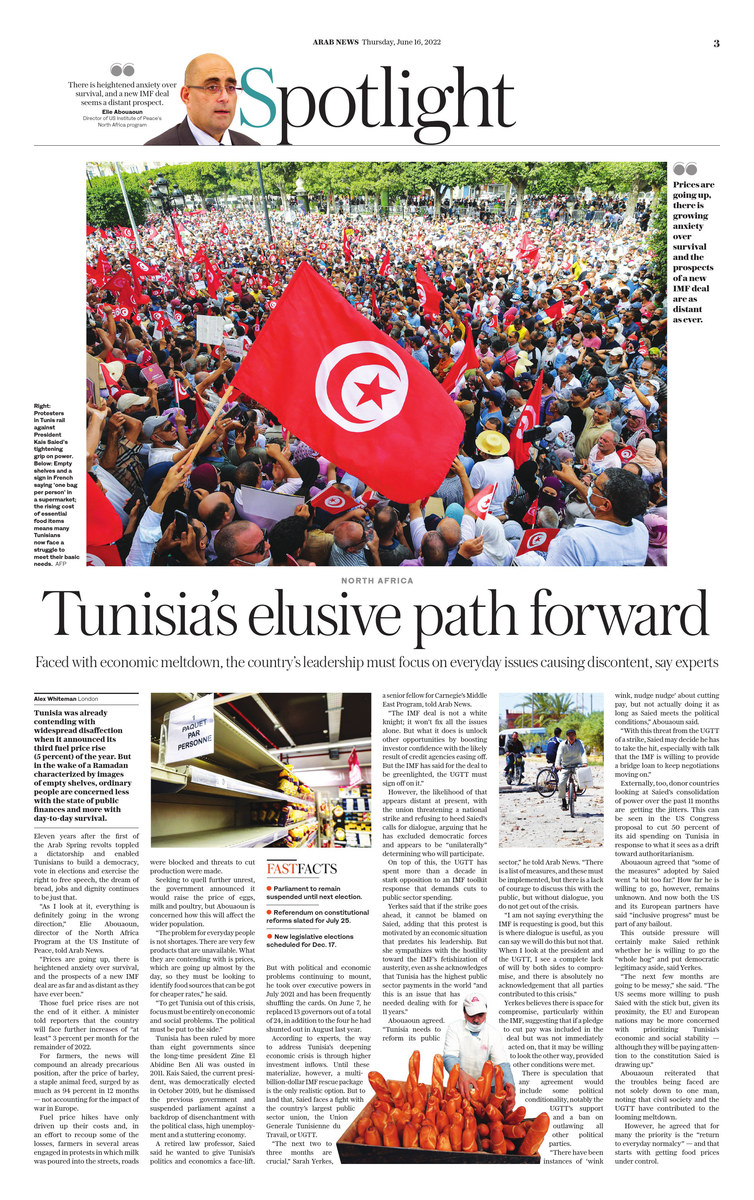LONDON: Tunisia was already contending with widespread disaffection when it announced its third fuel price rise (5 percent) of the year. But in the wake of a Ramadan characterized by images of empty shelves, ordinary people are concerned less with the state of public finances and more with day-to-day survival.
Eleven years after the first of the Arab Spring revolts toppled a dictatorship and enabled Tunisians to build a democracy, vote in elections and exercise the right to free speech, the dream of bread, jobs and dignity continues to be just that.
“As I look at it, everything is definitely going in the wrong direction,” Elie Abouaoun, director of the North Africa Program at the US Institute of Peace, told Arab News. “Prices are going up, there is heightened anxiety over survival, and the prospects of a new IMF deal are as far and as distant as they have ever been.”
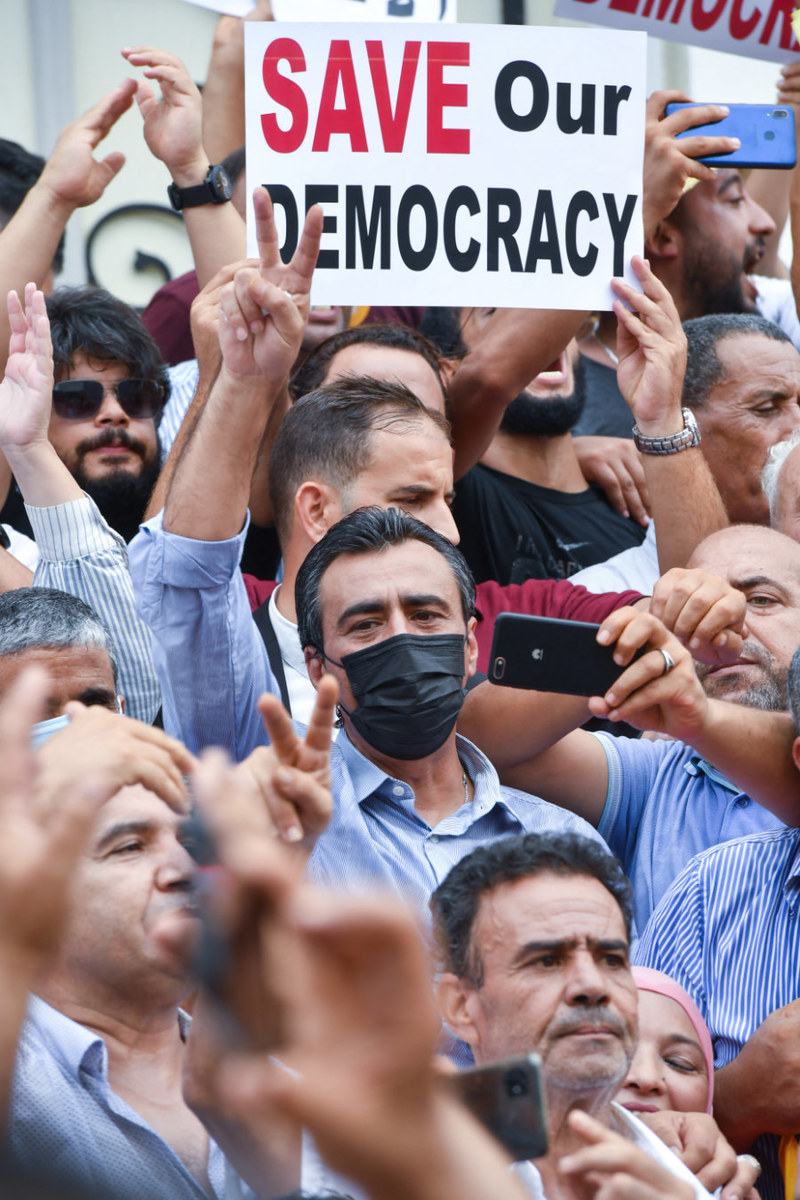
Protesters in Tunis rail against President Kais Saied’s tightening grip on power. (AFP)
Those fuel price rises are not the end of it either. A minister told reporters that the country will face further increases of “at least” 3 percent per month for the remainder of 2022.
For farmers, the news will compound an already precarious position, after the price of barley, a staple animal feed, surged by as much as 94 percent in 12 months — not accounting for the impact of war in Europe.
Fuel price hikes have only driven up their costs and, in an effort to recoup some of the losses, farmers in several areas engaged in protests in which milk was poured into the streets, roads were blocked and threats to cut production were made.
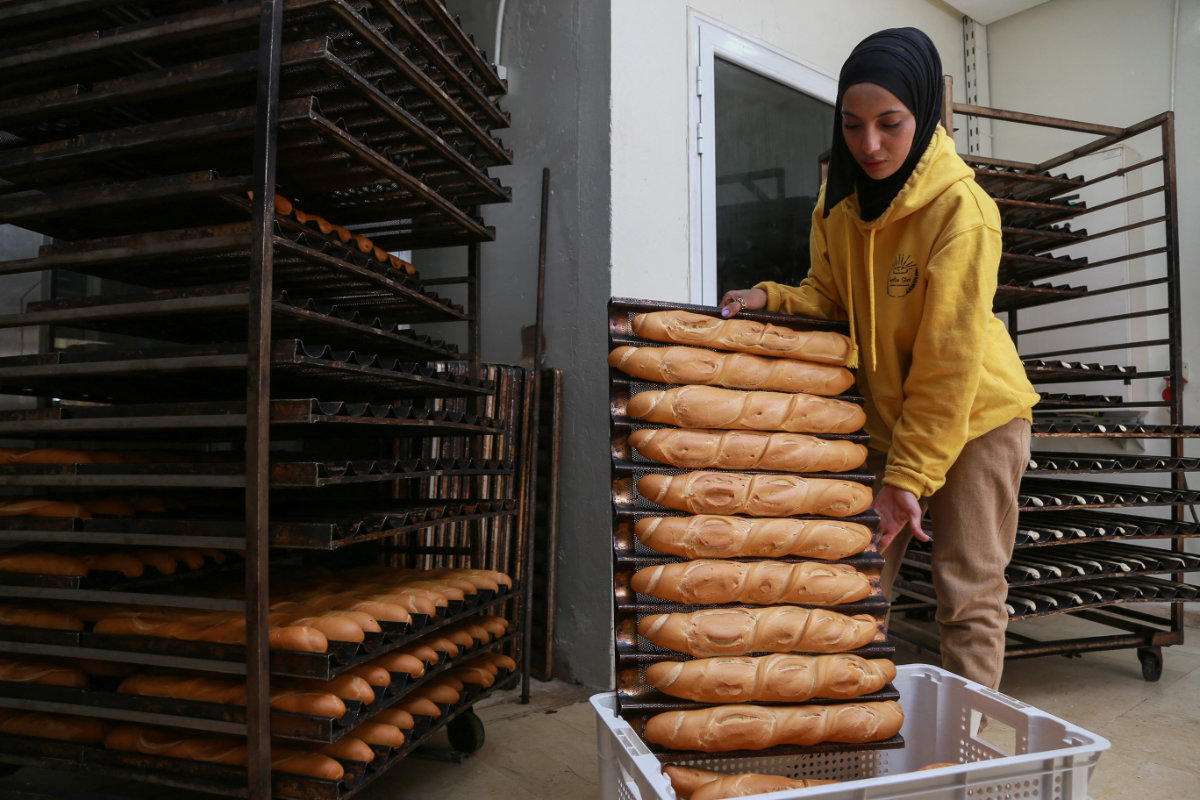
The rising cost of essential food items means many Tunisians now face a struggle to meet their basic needs. (AFP)
Seeking to quell the prospects of further unrest, the government announced it would raise the price of eggs, milk, and poultry, but Abouaoun is concerned how this will affect the wider population.
“The problem for everyday people is not shortages,” said Abouaoun. “There are very few products that are unavailable, what they are contending with is prices, which are going up almost by the day, so they must be looking to identify food sources that can be got for cheaper rates. To get Tunisia out of this crisis, focus must be entirely on economic and social problems. The political must be put to the side.”
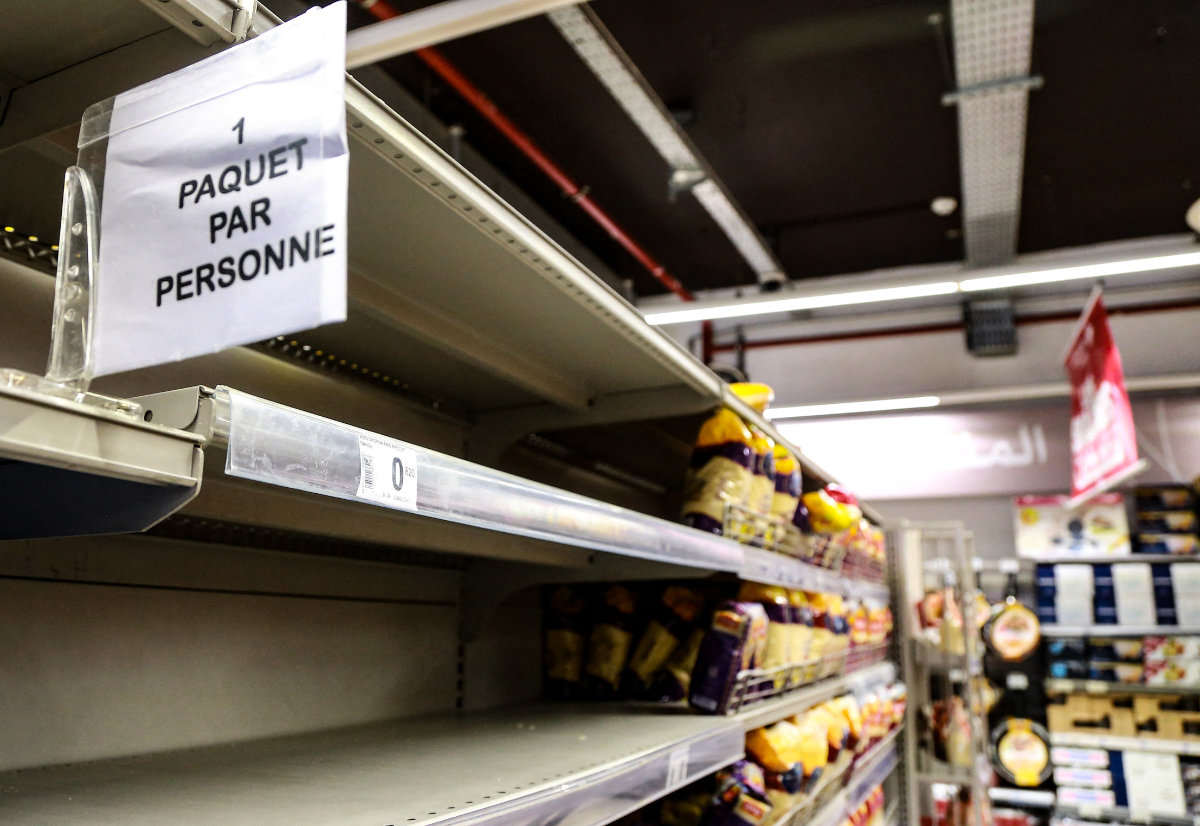
Empty shelves and a sign in French saying ‘one bag per person’ in a supermarket. (AFP)
Tunisia has been ruled by more than eight governments since the long-time president Zine El Abidine Ben Ali was ousted in 2011. Kais Saied, the current president, was democratically elected in October 2019, but he dismissed the previous government and suspended parliament against a backdrop of disenchantment with the political class, high unemployment and a stuttering economy.
A retired law professor, Saied said he wanted to give Tunisia’s politics and economics a facelift. But with political and economic problems continuing to mount, he took over executive powers in July 2021 and has been frequently shuffling the cards. On June 7, he replaced 13 governors out of a total of 24, in addition to the four he had shunted out in August last year.
According to experts, the way to address Tunisia’s deepening economic crisis is through foreign investment inflows. Until such investments materialize, however, a multi-billion-dollar IMF package is the only realistic rescue option. But to land that, Saied faces a fight with the country’s largest public sector union, the Union Générale Tunisienne du Travail or UGTT.
“The next two to three months are crucial,” Sarah Yerkes, a senior fellow for Carnegie’s Middle East Program, told Arab News. “The IMF deal is not a white knight; it won’t fix all the issues alone. But what it does is unlock other opportunities by boosting investor confidence with the likely result of credit agencies easing off. But the IMF has said for the deal to be greenlighted, the UGTT must sign off on it.”
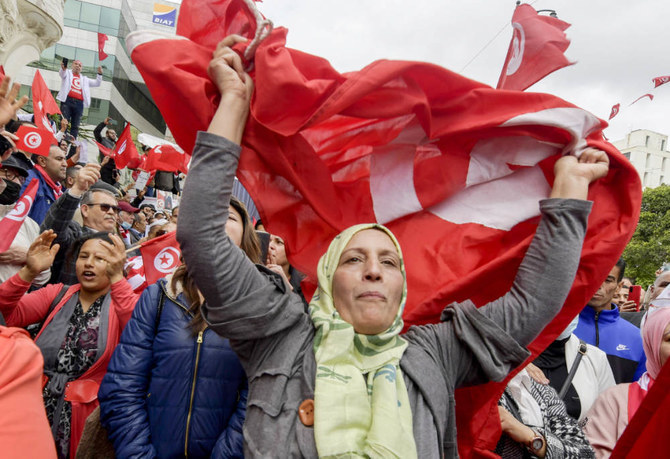
While President Kais Saied initially had ample support in his reform efforts, critics say he may have gone too far. (AFP file photo)
However, the likelihood of that appears distant at present, with the UGTT threatening a national strike and refusing to heed Saied’s calls for dialogue, arguing that he has excluded democratic forces and appears to be “unilaterally” determining who will participate.
On top of this, the UGTT has spent more than a decade in stark opposition to an IMF toolkit response that demands cuts to public sector spending.
Yerkes said that if the strike goes ahead, it cannot be attributed to Saied, noting that this protest is motivated by an economic situation that predates his leadership. But she can sympathize with the hostility toward the IMF’s fetishization of austerity, even as she acknowledges that Tunisia has the highest public sector payments in the world “and this is an issue that has needed dealing with for 11 years.”
FASTFACTS
Parliament to remain suspended until next election.
Referendum on constitutional reforms slated for July 25.
New legislative elections scheduled for Dec. 17.
Abouaoun agreed. “Tunisia needs to reform its public sector,” he told Arab News. “There is a list of measures, and these must be implemented, but there is a lack of courage to discuss this with the public, but without dialogue, you do not get out of the crisis.
“I am not saying everything the IMF is requesting is good, but this is where dialogue is useful, as you can say we will do this but not that. When I look at the president and the UGTT, I see a complete lack of will by both sides to compromise, and there is absolutely no acknowledgement that all parties contributed to this crisis.”
Yerkes said she believes there is space for compromise, particularly within the IMF, suggesting that if a pledge to cut pay was included in the deal but was not immediately acted upon, that it may be willing to look the other way, provided other conditions were adhered to.
There is speculation that any agreement would include some political conditionality, notably the UGTT’s support and a ban on outlawing all other political parties.
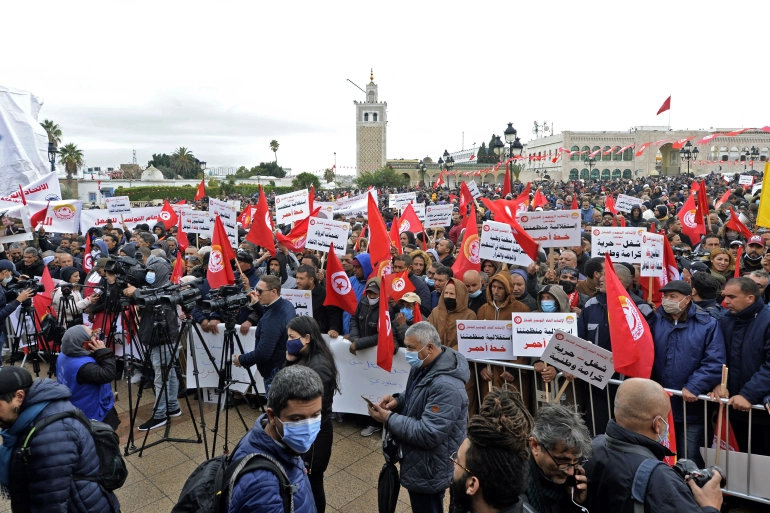
One formidable force against President Saied Kais' reform effort is the Tunisian General Labour Union (UGGT), which opposes the IMF's presciption to cut public sector spending. (AFP file photo)
“There have been instances of wink wink, nudge nudge about cutting pay, but not actually doing it as long as Saied meets the political conditions,” Abouaoun said.
“With this threat from the UGTT of a strike, Saied may decide he has to take the hit, especially with talk that the IMF is willing to provide a bridge loan to keep negotiations moving on.”
Externally too, donor countries are looking at Saied’s consolidation of power over the past 11 months and getting the jitters. This can be seen in the US Congress proposal to cut 50 percent of its aid spending on Tunisia in response to what it sees as a drift toward authoritarianism.
Abouaoun agreed that “some of the measures” adopted by Saied went “a bit too far.” How far he is willing to go, however, remains unknown. And now both the US and its European partners have said “inclusive progress” must be part of any bailout.
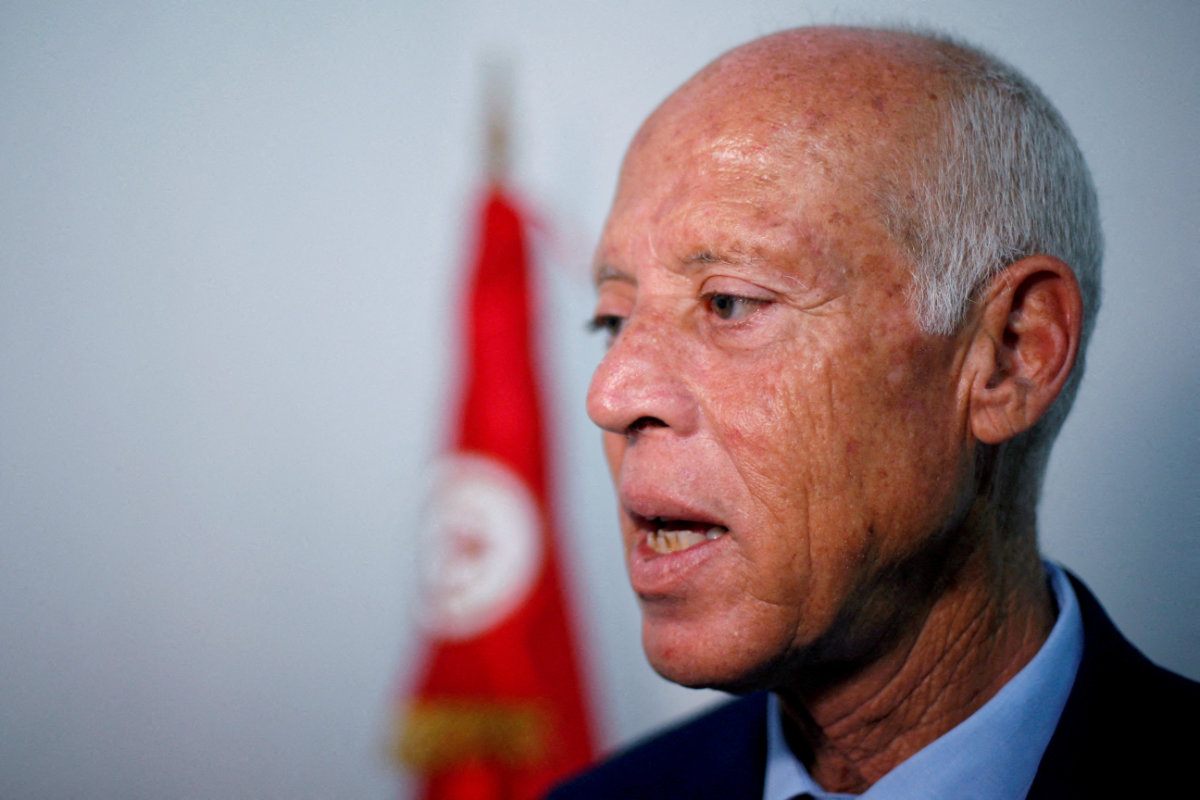
Tunisian President Kais Saied may have gone a bit too far in his quest to fix his country's problems, analysts say. (AFP)
This outside pressure will certainly make him rethink whether he is ready to go the “whole hog” and put democratic legitimacy aside, said Yerkes.
“The next few months are going to be messy,” she said. “The US seems more willing to push Saied with the stick but, given its proximity, the EU and European nations may be more concerned with prioritizing Tunisia’s economic and social stability — although they will be paying attention to the constitution Saied is drawing up.”
Abouaoun reiterated that the troubles being faced are not solely down to one man, noting that civil society and the UGTT have contributed to the looming meltdown, but he concurred that for many the priority is the “return to everyday normalcy” and that starts with getting food prices under control.
